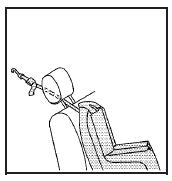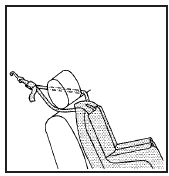Securing a Child Restraint Designed forthe LATCH System
CAUTION:
If a LATCH-type child restraint is not
attached to anchors, the restraint will not
be able to protect the child correctly. In a
crash, the child could be seriously injured
or killed. Make sure that a LATCH-type
child restraint is properly installed using
the anchors, or use the vehicle’s safety
belts to secure the restraint, following the
instructions that came with that restraint,
and also the instructions in this manual.
CAUTION:
Each top tether anchor and lower anchor
in the vehicle is designed to hold only
one child restraint. Attaching more than
one child restraint to a single anchor
could cause the anchor or attachment to
come loose or even break during a crash.
A child or others could be injured if this
happens. To help prevent injury to people
and damage to your vehicle, attach only
one child restraint per anchor.
CAUTION:
Children can be seriously injured or
strangled if a shoulder belt is wrapped
around their neck and the safety belt
continues to tighten. Secure any unused
safety belts behind the child restraint so
children cannot reach them. Pull the
shoulder belt all the way out of the
retractor to set the lock, if your vehicle
has one, after the child restraint has been
installed. Be sure to follow the instructions
of the child restraint manufacturer.
Notice: Contact between the child restraint or
the LATCH attachment parts and the vehicle’s
safety belt assembly may cause damage to
these parts. Make sure when securing unused
safety belts behind the child restraint that
there is no contact between the child restraint
or the LATCH attachment parts and the
vehicle’s safety belt assembly.
Folding an empty rear seat with the safety
belts secured may cause damage to the safety
belt or the seat. When removing the child
restraint, always remember to return the safety
belts to their normal, stowed position before
folding the rear seat.
1. Attach and tighten the lower attachments to the lower anchors. If the child restraint does not have lower attachments or the desired seating position does not have lower anchors, secure the child restraint with the top tether and the safety belts. Refer to your child restraint manufacturer instructions and the instructions in this manual.
1.1. Find the lower anchors for the desired
seating position.
1.2. Pull the strap at the center of the seat
where the seat cushion meets the
seatback. This will allow you to fold the
seat cushion up and out of the way.
Lift the flap to expose the anchors and then lower the seat cushion. See Rear Seat Operation on page 16 for additional information. Be sure the cushion is locked into place.
1.3. Put the child restraint on the seat.
1.4. Attach and tighten the lower
attachments on the child restraint to the
lower anchors.
2. If the child restraint manufacturer recommends
that the top tether be attached, attach and
tighten the top tether to the top tether anchor,
if your vehicle has one. Refer to the child
restraint instructions and the following steps:
2.1. Find the top tether anchor.
2.2. Route and tighten the top tether
according to your child restraint
instructions and the following
instructions. If your vehicle has a cargo
shade, route the top tether between
the seatback and the cargo shade.

Fold down the head restraint and route the single tether under the head restraint and in between the head restraint posts.

Fold down the head restraint and route the dual tether around the head restraint.
3. Push and pull the child restraint in different directions to be sure it is secure.
See also:
Securing Child Restraints (Front Passenger Seat)
This vehicle has airbags. A rear seat is a safer place to secure a forward-facing child restraint. See Where to Put the Restraint
.
In addition, the vehicle has a passenger sensing system which is ...
Starting the Vehicle with a Low Transmitter Battery
If the transmitter battery is weak, the DIC may display NO REMOTE DETECTED when
you try to start the vehicle. The REPLACE BATTERY IN REMOTE KEY message may also
be displayed at this time.
To star ...
Playing an MP3 CD-R or CD-RW Disc
The radio may have MP3 CD-R or CD-RW disc
capability. For more information, see Using an MP3 later in this section. ...


